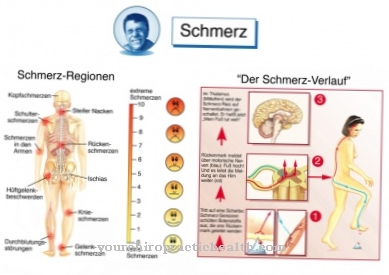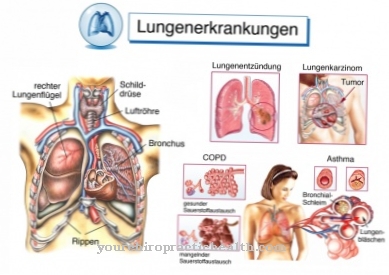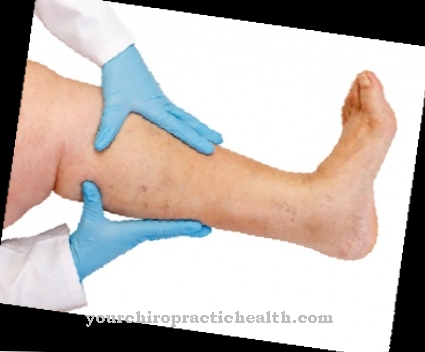A Impaired consciousness describes any deviation from the usual everyday or normal consciousness and is often mistakenly seen as an independent disease. But it is a symptom that can have various physical or psychological causes.
What are disorders of consciousness?

There are two different types of impaired consciousness. On the one hand there is the qualitative disturbance of consciousness, which occurs as a twilight state or confusion, mostly as a result of psychiatric illnesses, and the quantitative one.
Disturbances of consciousness can make themselves felt through various symptoms and are generally divided into two different forms: the qualitative and the quantitative disturbance of consciousness. Such a disorder is called qualitative if symptoms such as a short-term or permanent clouding of consciousness occur or if a fixation through thoughts and emotions on an experience takes place, so that the person concerned is limited in his responsiveness.
Shifts or extensions of consciousness also belong to this form. Quantitative disturbances of consciousness relate to the level of alertness and are divided into different degrees of severity. The symptoms of quantitative disturbance of consciousness range from drowsiness to increased sleepiness and coma.
This is a disorder of vigilance (alertness). This can be felt in a number of ways. On the one hand as drowsiness (slowed thinking, acting, difficult orientation) as well as somnolence (sleepiness, from which the can be woken up by external stimuli) or as sopor (patient can only be woken with great difficulty), and as coma (patient can no longer be woken) or delirium (Impaired consciousness and disorientation, as well as hallucinations).
In some cases there is also amnesia after the fact. This is a partial or total loss of memory. Sometimes only long-term or short-term memory is affected and after a while the memories come back.
causes
What are the causes of impaired consciousness? A disturbance of consciousness can have different causes. There are various psychiatric illnesses, such as schizophrenic psychosis, in which a patient suppresses his own self and takes on the role of another person. The trigger for this can be years of abuse in childhood.
The causes of impaired consciousness are diverse and in many cases cannot be clearly determined. Here too, of course, a distinction is made between the two types of disorder. Quantitative disturbances of consciousness can be attributed, for example, to increased intracranial pressure, but also to concussions or a traumatic brain injury. But there are also physical illnesses that can lead to a disturbance of consciousness. Even after a stroke, in which the brain can no longer be adequately supplied with oxygen due to a vascular occlusion, clouding of consciousness or constrictions can occur.
Another cause can be the blood sugar level, if it falls below 70 or exceeds 400. In general, respiratory and circulatory disorders as well as inflammation of the nervous system can lead to impaired consciousness. The causes of qualitative disturbances of consciousness are similar. Both inflammation in the brain and head trauma can be listed as the cause.
Mental disorders and illnesses can also affect consciousness. For example, people with traumatic experiences, dissociative disorders or psychoses often show symptoms that indicate a disturbance of consciousness. Medicines, drugs or alcohol have a depressant effect and excessive amounts can therefore cause symptoms.
Metabolic diseases such as diabetes mellitus or poisoning are also often responsible for impaired consciousness. A disturbance of consciousness or even just clouding is always a warning signal from the body and should be examined by a doctor immediately.
You can find your medication here
➔ Medicines against impaired consciousness and memory problemsDiseases with this symptom
- Diabetes mellitus
- Meningitis
- epilepsy
- Typhus
- Hypotension
- Encephalitis
- Sunstroke
- Food poisoning
- Anxiety disorder
- Mushroom poisoning
- concussion
- Early summer meningoencephalitis
- Sunstroke
- heatstroke
- stroke
Complications
The severity of the complications in a disturbance of consciousness depends not least on the cause that led to the disturbance of consciousness.
Without further influence, the condition of those affected can improve or worsen. In the worst case, those affected are no longer able to cope with their everyday lives.
The causes that can be responsible for different complications include:
- the stroke
- Skull injuries
- Poisoning from medication, food, alcohol, drugs, sunstroke and much more.
- general anesthesia (often in conjunction with other complications)
Hypoglycaemia (low blood sugar) with impaired consciousness often occurs in type 1 diabetics if the insulin is forgotten or incorrectly dosed. The risk increases the lower the average blood sugar value is.
A particularly serious complication of impaired consciousness is "delirium", which is known as a psychiatric emergency. In the worst case, it can lead to a coma. Anxiety and panic disorders as well as an acute risk of suicide are more common. Somnolence and sopor can also occur. Immediate inpatient treatment is necessary, as otherwise further complications such as respiratory arrest, heart failure or metabolic disorders can arise. The long-term consequences can lead to cognitive impairments, which can represent a considerable impairment in everyday life for those affected.
In addition, cerebral seizures, respiratory arrest and hypoglycemia with the risk of shock are known as a result of impaired consciousness.
When should you go to the doctor?
Consult a doctor immediately in the event of impaired consciousness. In most cases, the disorder is due to another disease that must be found and clarified. Some of the underlying diseases can be classified as life threatening. Therefore, a doctor should be consulted immediately in the event of repeated impairment of consciousness. The impairment of consciousness is mostly based on functional disorders of individual brain areas.
These can suffer lesions in the event of falls, accidents or inflammation. Bleeding or swelling of tissue in the brain are usually insidious processes that are associated with impaired consciousness as a symptom. The triggering event is often a few days ago and is therefore not necessarily associated with the current disorders of consciousness.
For this reason, disturbances of consciousness are to be regarded as serious warning signals in many cases and require a quick reaction. This is also the case if the disturbances only occur for a short time. Bleeding in the brain can lead to a stroke. Since this can be fatal or cause life-long impairment, those affected should undergo a thorough examination.
In addition, functional disorders of individual organs can lead to impaired consciousness.As soon as one system in the organism is impaired, other organs are exposed to greater stress. It can lead to further partial or even total failures of the organs. This is often associated with symptoms such as a disorder of consciousness in advance.
Doctors & therapists in your area
Treatment & Therapy
How can disorders of consciousness be treated? The treatment of disorders of consciousness is of course based on the causes that are responsible for the disorder, a comprehensive diagnosis is therefore essential. Especially at the beginning of severe impaired consciousness, the patient should be permanently monitored and given medical care.
The basic goal of treatment should be stabilization of consciousness. Physiotherapists can provide additional support by doing exercises to stimulate the circulatory system, among other things. Triggers such as a stroke should generally be treated in a rehabilitation clinic. In some cases, drugs that affect the consciousness and help stabilize it are used for milder disturbances of consciousness.
People who suffer from a disorder of consciousness due to mental illness can find help in psychotherapy in addition to appropriate medication.
Outlook & forecast
The prognosis for impaired consciousness depends very much on the respective disorders themselves. In cases of impaired consciousness, there is usually severe social exclusion. Often the person concerned complains of fears and feelings of insecurity as well as depression. Treatment by a psychiatrist is highly recommended. Treatment with a psychologist or psychiatrist can be successful if the person concerned is aware of the impaired consciousness and wants to do something about it. In many cases, treatment is also carried out in parallel with medication, which can lead to headaches and fatigue.
Without treatment, the impaired consciousness usually does not go away on its own. It is a psychological problem. It can also happen that certain things are done which the patient cannot remember and which were not intended. Often people with impaired consciousness feel very slow thinking and only a limited capacity for information.
The highest case of impaired consciousness is coma. In this case, no direct treatment is possible. It has to be seen if and when the person wakes up from the coma.
You can find your medication here
➔ Medicines against impaired consciousness and memory problemsprevention
How can you prevent impaired consciousness? Since there are so many different causes, it is hardly possible to completely prevent a disturbance of consciousness. Nevertheless, certain precautions can be taken to reduce the risk. For example, a stroke often develops out of a wrong lifestyle.
Adequate exercise, a healthy diet, and regular relaxation phases can help prevent this diagnosis from occurring in the first place. Medicines and alcohol should also be handled responsibly to avoid excessive use or poisoning. Since disorders of consciousness should be treated as soon as possible, symptoms should be taken seriously and a doctor should be consulted immediately if they are suspected.
You can do that yourself
Whether the means for self-help are really effective in the case of impaired consciousness depends very much on the level of the impaired consciousness. If these occur only rarely and are not particularly severe, the person concerned can do something about it himself. In most cases, the impaired consciousness is caused by the consumption of certain medications or drugs. In order for these disorders to disappear, the respective preparation must be discontinued. A doctor or, in an emergency, withdrawal can help.
The patient must actively take action against the impaired consciousness. This includes learning and thinking tasks so that the brain can develop its full function again. In some cases, the disturbances in consciousness can occur due to stress and lack of sleep. Here the body needs rest and relaxation. In the case of severe impaired consciousness, home remedies usually do not help and a doctor must be consulted.
There is no direct treatment for dementia or Alzheimer's disease, here the patient relies on the help of his fellow human beings or that of caregivers in order to cope with everyday life. If the impaired consciousness occurs due to psychological problems, psychological treatment can help. In the strongest form of impaired consciousness - the coma, no means of treatment are possible. This state is largely unexplored and cannot be directly influenced.













.jpg)

.jpg)
.jpg)











.jpg)